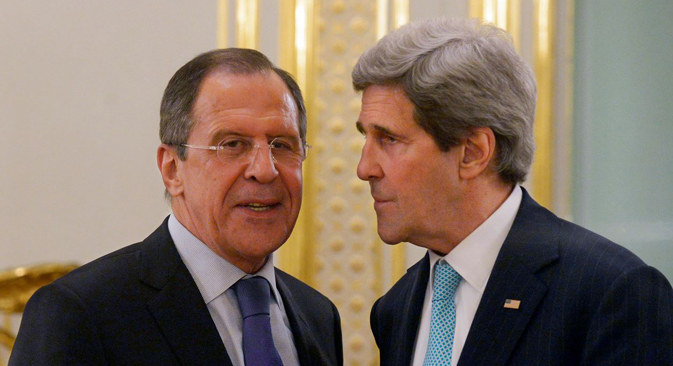
Russian Minister of Foreign Affairs Sergei Lavrov (Left) and U.S. Secretary of State John Kerry (Right). Source: flickr.com / Eduard Peskov, Russia's Foreign Ministry
Despite clear differences of opinion at Sunday’s talks in Paris, Moscow and Washington have tentatively agreed to work with the government in Kiev to ensure respect for the rights of national minorities, the disarmament of provocateurs, implementation of constitutional reform and the holding of elections.
Accordingto Russian Minister of Foreign Affairs Sergei Lavrov, the United States is willing to consider Russia’s opinion of the need to federalize the neighboring state.However, U.S. Secretary of State John Kerry stressed that the U.S. was not going to determine the path of development of Ukraine, and that federalization was only an option if the Ukrainian government agreed to it.
"The U.S. and Russia have differences of opinion about events that led to this crisis but both of us recognise the importance of finding a diplomatic solution and simultaneously meeting the needs of the Ukrainian people, and that we agreed on tonight," Kerry said.
According to the Russian Minister, the meeting with the Secretary of State, which was not planned in advance, and which followed a telephone conversation between the two leaders, was “very, very constructive.” “We held intensive talks primarily on the crisis in Ukraine,” he said. “We expressed discordant views on the reasons it occurred, but agreed to find common ground to resolve the situation in Ukraine.”
Turning to the document executed after the meeting, Lavrov said: “We agreed to work with the Ukrainian government, with the Ukrainian people, in the broadest sense of the term, in order to pursue the implementation of such priority measures as respect for the rights of minorities, language rights, the disarmament of provocateurs, the implementation of constitutional reform, and holding free and fair elections under impartial international supervision.”
In reality, according to Russian experts, this means that Russia and the United States have agreed on joint steps for the first time since the beginning of the Ukrainian crisis.
Igor Istomin of MGIMO (Moscow State University of Foreign Affairs) said in a conversation with RBTH that: “Recent statements by Lavrov and Kerry show a moderation of positions and the beginning of a dialogue.”
“Russia and the United States are not going to bring the situation to an extreme,” said the expert. However, he drew attention to the fact that future negotiations would depend on not only the Russian Federation and the United States, but also on events in Ukraine: “The events in Ukraine have their own political dynamics, and there are serious political players there.”
In a live interview with Kommersant FM, the Dean of the Faculty of World Economics and International Affairs of the Higher School of Economics, Andrei Suzdaltsev, said it was very important that Russian-American dialogue had started. “Now this stage, of the reaction of the Western world, the U.S. and the EU to the referendum in Crimea and the joining of Crimea to Russia, is coming to an end. Various forms of sanctions were tried, and the West saw evidence once again that we would not react to them, and the impact on Russia turned out to be insignificant,” explained the expert.
“Now, expert organizations will join in, the search for solutions will begin, and apparently, there will be a road map developed to resolve this crisis. Of course, this is better than any confrontation,” said Suzdaltsev.
“Gradually, the West is beginning to understand the complexity of the events that occurred in Ukraine and Russia’s position,” said Pavel Podlesny, the head of the Center for Russian-American Relations at the Institute for US and Canadian Studies, in comments made to Pravda.ru. “There is no other way to preserve Ukraine but through federalization,” he said.
Alexei Arbatov, political scientist and member of the Russian Academy of Sciences, said in an interview with RBTH that the “talks between Lavrov and Kerry were constructive, despite the general skepticism.” According to the expert, now that Russia and the U.S. have started talking about the federalization of Ukraine, its territorial integrity, legitimate elections, and constitutional reform, this means that a basis for further dialogue has been laid and “we can start the process of rapprochement.” However, Arbatov notes that it is difficult to say in advance whether the representatives of the two countries will be able to reach an agreement on the Ukrainian issue. “I think it is possible, if the appropriate political impulse is given,” he said.
Meanwhile, Pavel Podlesny was at pains to point out that Ukraine was still on the brink. According to him, the situation is still fraught there, and Russia cannot guarantee that military intervention will not be needed. “Russia cannot give such a guarantee, because one of the options for further developments in Ukraine is its possible disintegration. Russia must be ready for any scenario in Ukraine,” emphasized the expert.
All rights reserved by Rossiyskaya Gazeta.
Subscribe
to our newsletter!
Get the week's best stories straight to your inbox